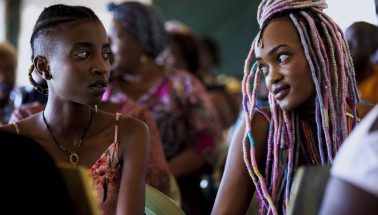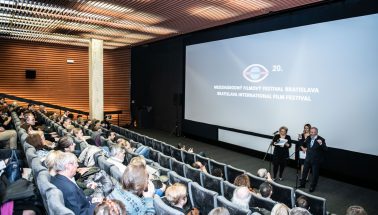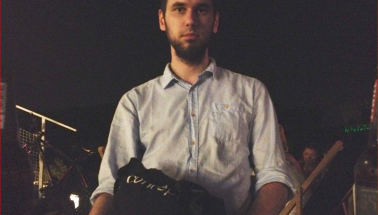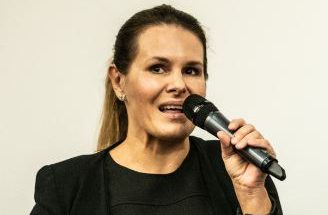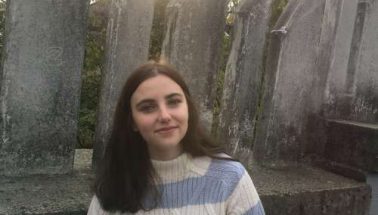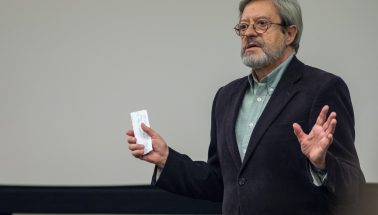The selection of films to compete at the 2016 Bratislava International Film Festival (BIFF) offers a colourful palette of themes and formal approaches preferred by aspiring filmmakers as the festival remains faithful to its principal mission of directing audiences’ attention at young talent of contemporary world cinema. They will vie for the festival’s official awards in the following categories: first and second fiction films, first and second documentary films, and short films.
The festival’s triplet of international competitions will feature filmmakers who have been awarded at film festivals around the world as well as those who are only awaiting their international breakthrough.
The Competition of Fiction Films will present eight motion pictures hand-picked by Nenad Dukić, Head of Programmers at BIFF and film critic from Serbia. Several titles from his final selection reflect on one of the topics that keep political leaders busy and public opinion bothered, namely that of religious extremism.
The Swallow (Die Schwalbe, 2016), a fiction debut by Kurdish-Syrian director Mano Khalil marks its Slovak premiere at the festival where it will be presented in person by the director. In the domestic context, Khalil is an interesting figure also because he studied film directing at FAMU in Prague and VŠMU in Bratislava. While many of his friends at home joined Kurdish freedom fighters, Khalil pursued a different calling and decided to use film to fight for his fatherland’s freedom. After he moved to Switzerland in 1996, he founded his own production company, Frame Film, which also produced The Swallow.
The picture follows 27-year-old Mira as she travels from Switzerland to Iraqi Kurdistan to look for her father who abandoned the family before she was born in order to fight the regime of Saddam Hussein. Once in Kurdistan, Mira encounters terrorism, crimes, unexpected findings about her family story, but also love. A journey through the breath-taking landscapes of Kurdistan, Khalil’s film offers a completely new perspective of Kurdistan’s political reality against the backdrop of a young woman seeking her identity on the crossroads of cultures. The film was finished just days before ISIS seized the city of Mosul.
The fiction competition will also feature many other remarkable motion pictures, for instance Wordly Girl (La Ragazza del Mondo, 2016), first feature-length film by young Italian filmmaker Marco Danieli that tells a story of a young woman whose education, aspirations and personal relationships are repressed by her family’s rigid habits guided by strict religious beliefs. The film made it to the official selection of this year’s Venice IFF. One of the most impatiently awaited films in competition is Dogs (Câini, 2016), a debut by Bogdan Mirica that is a testimony to its author’s rich artistic potential. The film premiered as part of Un Certain Regard at this year’s Cannes IFF and won the FIPRESCI award, illustrating the strong continuity of filmmakers from the Romanian new wave. The plethora of young talent from the Balkans is also represented by Hana Jušić, a Croatian directress whose second feature-length film, Quit Staring at My Plate (Ne gledaj mi u pijat, 2016), won the Fedeora Award at 2016 Venice IFF. Refreshed by Jušić’s imaginative directing style, the film revolves around a young girl trying to extricate herself from the strictures imposed by her patriarchal family.
This year’s Competition of Documentary Films that was put together by BIFF Programme Director Pavel Smejkal is dominated by female documentarists whose films rank high among the best works this festival season has to offer. An experienced documentary camerawoman who is kept busy by such luminaries of the trade as Michael Moore or Laura Poitras, Kirsten Johnson decided to sit in the director’s chair again after more than a decade to deliver Cameraperson (2016), a deep self-reflection about the world viewed from behind the camera that touches upon filmmaker’s code of ethics based on the vast trove of footage she has shot over decades around the world. So far, the film has claimed main prizes at Sundance, San Francisco and Sheffield.
The documentary competition will also present LoveTrue (2016), the latest film by Israeli directress Alma Har’el whose dreamy contemplation of actual love won the documentary competition at this year’s Karlovy Vary IFF, as well as Communion (Komunia, 2016), a debut by Poland’s Anna Zamecka about a prematurely grown-up 14-year-old Ola who heroically substitutes the role of both parents in a dysfunctional family that has been decorated at film festivals in Locarno and Warsaw.
Traditionally selected by Dutch curator Erwin Houtenbrink, the Short Film Competition offers a broad variety of film styles that come from the best traditions of documentary, animation, fiction, abstract and essayistic filmmaking. As usually, vying for the Best Short Film award will be titles that have screened at renowned film festivals in Berlin, Cannes, Rotterdam, and Oberhausen. One of the freshest titles in competition is Gerontophobia (2016) by Boris Sverlow that premiered internationally several weeks ago at the Busan IFF in South Korea. Combining the means of expression borrowed from silent era and animation films, Sverlow takes the viewer on a journey to a utopian society whose scientists in an effort to invent a drug against ageing cause a disaster – a gas that accelerates ageing.
Returning to Bratislava to defend her “championship title” is Greek directress Konstantina Kotzamani with her newest picture, Limbo (2016); last year, she won the Short Film Competition with Washingtonia. Besides Kotzamani, the final selection also includes three other filmmakers whose works have been screened at previous editions of the Bratislava IFF. A grand duo of German filmmakers who work with so-called found footage, Christoph Girardet and Matthias Müller are coming to BIFF with their latest picture, Personne (2016). The third comeback is marked by Bülent Öztürk, a Kurdish-Belgian filmmaker who visited Bratislava three years ago with Houses with Small Windows (2013); this year he is coming with his latest film, Shadow (Sî, 2016).

